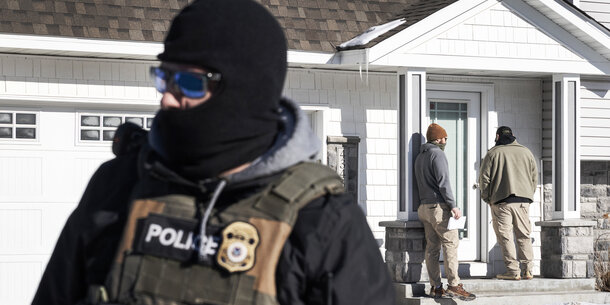In October 2016, federal agents installed a pole camera facing directly at the front of Bruce Hay’s home in Osawatomie, Kansas, capturing Mr. Hay’s porch, front yard, and driveway, an area referred to as the curtilage. The agents used the camera to surveil Mr. Hay without a warrant for nearly ten weeks as part of their investigation into whether Mr. Hay, a veteran, had fraudulently claimed a disability to receive benefits. The agents could watch the camera’s feed in real time from a remote location, and remotely pan, tilt, and zoom close enough to read license plates or detect what someone was carrying in or out of the house. From this, they could learn a great deal of sensitive information about Mr. Hay’s activities and associations.
Mr. Hay filed a motion to suppress the pole camera footage, arguing that long-term surveillance of a home constituted a search under the Fourth Amendment, particularly in the wake of the Supreme Court’s 2018 decision in Carpenter v. United States. On May 5, 2022, the U.S. District Court for the District of Kansas denied Mr. Hay’s motion to suppress the pole camera footage, ruling that his arguments were foreclosed by Tenth Circuit precedent and that this kind of surveillance does not qualify as a search under the Fourth Amendment. In doing so, the district court acknowledged that “Hay may well be right that the Tenth Circuit should, in light of Carpenter, reconsider” its precedent.
The Brennan Center joined an amicus brief penned by the American Civil Liberties Union (ACLU), supporting Mr. Hay in his appeal to the U.S. Court of Appeals for the Tenth Circuit. The ACLU of Kansas, the ACLU of Colorado, the Electronic Privacy Information Center, and the Center for Democracy and Technology joined the amicus brief as well. Our brief argues two points.
First, conducting long-term, around-the-clock pole camera surveillance of a person’s home and its curtilage violates the Fourth Amendment right to be secure in our homes against unreasonable searches. Even if the home is in public view, surveillance that is protracted over weeks can reveal patterns in a person’s activity that can be just as sensitive as the historical cellphone location information at the center of Carpenter. Over time, pole camera surveillance of a home can reveal deeply sensitive information such as the identities of a person’s visitors, whether they regularly leave their home with a protest sign or a prayer shawl, and whether they are holding documents such as medical bills or ballots.
Second, the degree of privacy provided by the Fourth Amendment should not depend on whether someone can afford to block the government’s view into their home by, for example, building a fence around their property. Requiring affirmative steps to block government monitoring will make – and has made –people with limited financial resources, who are disproportionately likely to be people of color, more vulnerable to warrantless surveillance.
On March 19, 2024, a three-judge panel for the Tenth Circuit found that the government’s long-term pole camera surveillance of Mr. Hay’s home did not violate his Fourth Amendment rights. In doing so, the circuit court declined to reconsider its precedent in light of Carpenter. It instead found that the surveillance was permissible without a warrant because the pole camera only captured activity in public view. Additionally, while Carpenter made clear that individuals have a Fourth Amendment privacy interest in the whole of their physical movements, the Tenth Circuit found that the pole camera surveillance did not provide such a comprehensive view of Mr. Hay’s whereabouts because it only captured Mr. Hay’s activity at a single location, outside his home. Finally, the Tenth Circuit found that the prevalence of recording cameras in the modern world reduced any reasonable expectations of privacy from filming. As such, the court concluded that Mr. Hay’s Fourth Amendment rights had not been violated, and it affirmed the district court’s decision.
United States v. Hay (Amicus Brief) by The Brennan Center for Justice on Scribd

